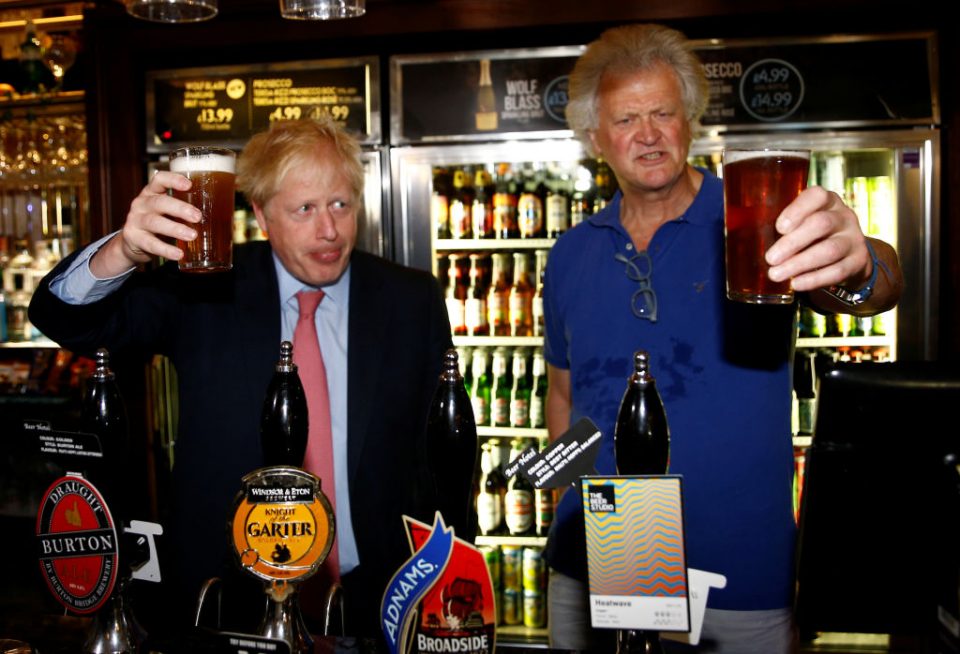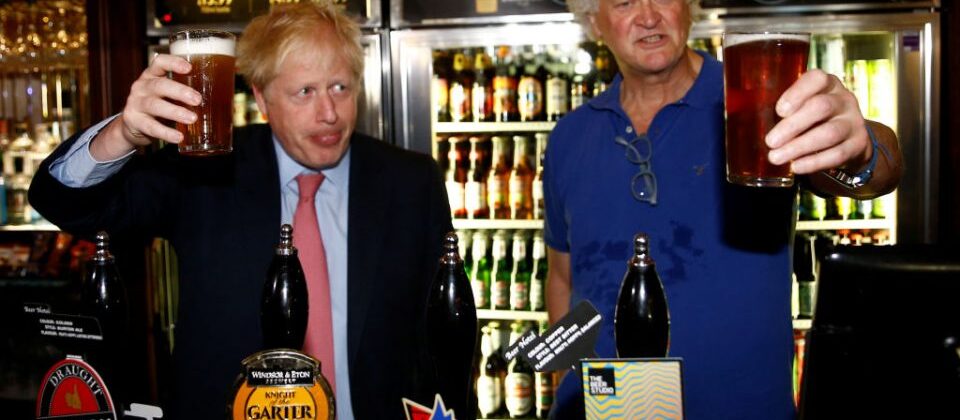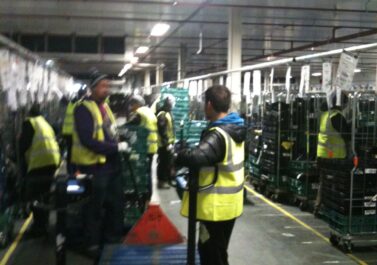
Around 9.1 million workers in the UK were placed in the government Job Retention Scheme (JRS) with the implementation of “lockdown”. This meant that workers would stay home and the government would subsidise 80% of labour costs whilst it was impossible for workers to work. Around 2.9 million workers are employed in the hospitality industry in the UK, and it was perhaps one of the most effected sectors in the Covid Crisis.
J. D. Wetherspoons is the biggest independent pub chain in the UK, employing around 42,000 workers across the UK in 872 different locations. Along with pubs the company also operates a number of hotels and has an in-house delivery system. Wetherspoons has been a hot target for both the liberal media, due to Tim Martin’s support for “Brexit” and the Conservative Party, and the soft Left due to its popularity with young people as a cheap drinking spot and due to a localised unionisation drive in Brighton headed by the Bakers, Food and Allied Workers’ Union (BFAWU).
One Angry Worker has been working in a busy city centre Wetherspoons pub for over a year.
(This first part of the interview was conducted between the 1st and 3rd of July, just before the UK government gave the go ahead for pubs and restaurants to re-open on the 4th.)
I began working at Wetherspoons in late 2019, coinciding with a fresh wave of booze hungry 18 year olds piling up in the city centre. It’s important to mention this, because the new university year is the peak business time of the year in the pub/drink industry. I was one of around 15 new hires at the end of September, and when I started, there were probably around 30-35 front of house workers on the payroll. This represents one of the first important parts of the labour process in the company and the sector more widely. It’s pretty widely appreciated that hospitality has a high turnover and mostly relies on young labour. When I started aged 21, I was probably, on average, one of the older workers on the front of house staff. Another problem for organising is that around 50% of workers would move on within 3 months. The longer term workers, those who stayed for more than a year, filled the overbearing management structure entirely. The workforce is divided in terms of Associate, Team Leader, Shift Leader, Shift Manager, Duty Manager, and Pub Manager. There’s no separation of the process of work or what you actually do on the job between Associate and Shift Leader. In terms of pay, there is about 70p per hour difference between the entry pay (£8.72) and the Shift Leader pay (around £9.40).
* How did work change in the run up to the lockdown?
The main thing that changed was that we were pushed to do a hell of a lot more cleaning. A bunch of people were also calling in sick which made the work a bit strained, because the gaps weren’t really filled. Although, I know a few people didn’t call in sick even if they suspected they might have Corona ‘cause the sick pay was so shit. I had to call in sick in the end though, because one of my mates who I had been in contact with got ill.
The problem with that is that loads of us work way over what is on our contracts as “guaranteed minimum hours” so most people were probably working near to double what was on their contract, ‘cause they give you a number when you start and then promise that they’ll up it after 3 months but management never really bothered to go through with that process. When they asked management if they could get their contract changed to reflect a more realistic amount of hours they worked per week, and they were told that Head Office had banned all changes to contract about 2 weeks before, so they were pretty pissed off because it was pretty clear that the bosses had anticipated the pubs having to close and were covering their backs to pay the least out as they could get away with.
* How did management respond when the pub had to close? How did workers feel about that? Was there a change in power dynamics between bosses and workers?
In our pub, the management generally seemed to be pretty sympathetic to the fact that the pubs had to close. It’s weird though cause a bunch of the management are pretty much the same as the associates, like they have a bit more responsibility and that, but there are probably around 9 managers and only 3 of them get paid anything more than £1.50 more than the lowest paid workers, so everyone seemed to be equally pissed off.
The stuff coming from Head Office was ridiculous though. I’m actually dreading going back to work knowing that I work making money for Tim Martin after all that stuff he said. We started getting emails about how it was impossible for anyone to catch Coronavirus in a Wetherspoons cause they’re all so clean apparently. We were also asking if we could wear masks and gloves and that at work, but management said that it wasn’t allowed, some of us argued and they let us wear gloves while handling glasswork after a bit of back and forth and they conceded that the “Employee Handbook” probably wasn’t written with a global pandemic in mind.
There was a campaign ran by the Bakers, Food and allied Workers Union after the pubs eventually shut, because Wetherspoons had decided not to take the risk in fronting the money to pay the workers before the furlough business was clarified by the government, so they pretty much left us all without pay. The BFAWU campaign put a load of pressure on the company through petitions and lobbying MPs and eventually they agreed to pay everyone the 80%, even if it did come at the same time as the government announcing that they compensation for furlough pay would be immediate.
For the first time people were talking about unions and that amongst co-workers, obviously this was all done in group chats and a video call or two, but there was some sense that we should probably start thinking about what we could do to stop the company sort of throwing us under the bus again.
(This part of the interview covers the period of August to December 2020, when the second lockdown started)
* What happened when the pub re-opened after the first lockdown? How did the conversations about ‘unions’ continue?
There were a couple of occasions where we had people call the pub to tell us that they had tested positive and had been in in the last 48 hours. Management decided in both of these instances that because the call hadn’t come from the NHS then it must have been a prank call. This pissed a lot of us off. It was around then that a group of us got together and decided to join the UVW. We decided that the UVW would be a better bet than BFAWU mainly because I had a mate who works for them who happened to be staying with me at the time who was willing to chat to the workers. I also know that UVW are a bit more rank-and-file and militant by design than a union like BFAWU, and it was a particularly hot moment so it was probably better to avoid the lengthy wander through bureaucracy in case there was a chance to do anything quick.
We started having semi-regular meetings, and the amount of workers in the union quickly grew from around 15% to 30% of the shop floor within a month. Outside of the union, we reckoned with a bit of haphazard mapping that probably 60% of the workers would be on board if things started to properly heat up. We hadn’t ever really had anything like this situation before, most of the workers are young and have hardly heard of unions before or the general idea that workers don’t actually have to swallow whatever the boss feeds them, so it was quite an exciting and dynamic time with regards to work alone.
There were a few long discussions about the conditions of work. Obviously this was focused on Covid for the most part, but after a few meetings this started to broaden out into more fundamental problems. As the meetings went on people started to talk about how the work had gotten harder and we were still essentially being paid less than normal, because most of us had had our hours cut as part of the “flexi-furlough” which meant that we would be paid a baseline of 80% of our average weekly pay (worked out on a basis of hours of work per week over the last 12 months, excluding any weeks you didn’t work), and paid the full 100% for any hours you actually worked.
So if you were to work 20hrs in the week, where your usual hours would be 35hrs, you would be paid 100% for 20hrs and 80% for the remaining 15hrs. Working at a rate of £8.82 you would receive a weekly pay of £282.24 (before tax) rather than the usual rate of £308.70, so in real terms it was roughly a £35 per week pay cut for full time workers, around £140 per month. From here it got into a discussion of how shit the pay was even before the pandemic and this pay cut and there was even a general sentiment that down the line we should push for a living wage. Mostly though, there was a lot more chatter about what we could do and demand in the current situation around safety and sick pay.
There were a couple of instances where we actually took collective action. During the whole Eat Out to Help Out madness, we were working with a skeleton crew every night at a breakneck pace with the kitchen being absolutely overwhelmed because there were probably triple the amount of food orders as usual, so the kitchen at one point told me that they just wanted to refuse any more orders, because one of them had had a breakdown over the stress and there was only two of them in there. I went and had a quick chat with a couple of the workers who were in the union and we just turned off all the food on the till, so we essentially downed tools and forced the manager to not let anyone in and shut the pub for over an hour. Not exactly a massive wildcat strike, but the manager did angrily say that she had never had seen anything like that in 13 years working at the company, so it’s the small victories.
The other occasion where we took collective action was when two workers in, two consecutive days, went home mid-shift displaying Covid symptoms. The manager basically decided that nobody else had to isolate, and made up a definition of “close contact”, that meant that none of us had a right to isolate. This pissed us off, because a bunch of us had been on shifts with the co-workers who displayed symptoms. We had a quick meeting and sent a pretty much co-authored message to the manager saying that we were pissed off and that we would be isolating and think thought that we should get paid for that isolation period. It ended up with the boss agreeing that we could isolate if we thought we should, and it turned out later that we had managed to convince him to skew it so we got full pay over those 14 days.
These were both little things, and didn’t exactly shake the earth underneath Spoons, but its pretty much unimaginable that they would have happened or even have been possible before the pandemic.
* What happened then?
The main problem since then has been the stop/start nature of work. We went back for a few months, then closed again in October, then re-opened in December and closed before the new year. Each time we have gone back, we made some momentum with the whole organising business and then that momentum sort of just pissed itself away when we were closed. It doesn’t look like we will be going back to work before the end of Spring 2021 now, so there isn’t really a way of telling what work will be like when we do re-open.



